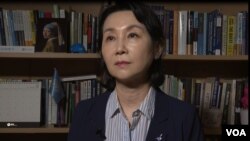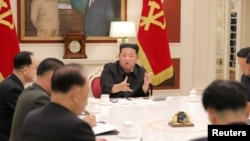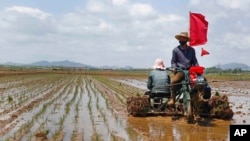South Korea’s newly appointed human rights envoy for North Korea called upon the international community to cooperate with Seoul to improve the human rights of those living under the Kim Jong Un regime.
Lee Shin-hwa, a political science professor at Korea University in Seoul, said she believes such an effort is necessary for the “survival” of the people in what Human Rights Watch describes as “one of the most repressive countries in the world.”
Lee is two weeks into her new position that began on July 28 and holds the formal title of ambassador of international cooperation on North Korea human rights.
The position, created in 2016 as a part of the North Korean Human Rights Act, was left unfilled for nearly five years during the administration of former President Moon Jae-in, who prioritized inter-Korean reconciliation efforts.
In an interview with VOA in Seoul on August 3, Lee emphasized that “the issue of North Korea’s human rights is the issue of the international community.”
“The improvement of human rights issues and the growth of democracy are on a parallel path,” Lee said. “With that understanding in mind, we must approach North Korean human rights not only as an issue to be worked out between South Korea and North Korea but by [the] international community based on the values of universal human rights.”
North Korea is recognized for violating the basic rights of its citizens such as the freedoms of movement, speech and assembly. The regime, ruled by three generations of the Kim family, uses torture, forced labor and extrajudicial killings to maintain control.
According to the final report that Tomas Ojea Quintana, former U.N. special rapporteur on human rights in North Korea from 2016 to July 2022, submitted to the U.N. in March, human rights in the country have deteriorated over the past six years.
“To the people of North Korea, the issue of human rights is the issue of survival,” Lee said. “To the regime of North Korea, the issue is uncomfortable truth. It is truth the regime wants to hide.”
She continued, “We have come upon this important crossroad” where democratic countries emphasize “human security” while Pyongyang wants to maintain “the regime security.”
She added that trying to improve human rights and inter-Korean ties should not be a paradoxical pursuit. She said failing to deal with human rights abuses for the sake of pursuing talks Pyongyang would find upsetting is not the right approach.
The Kim regime believes its tight control of the people and its nuclear weapon and missile developments are critical to its security. The Moon government was often criticized for pursuing inter-Korean reconciliation while overlooking human rights.
In March, Human Rights Watch and 29 nongovernmental organizations wrote a letter to Moon, criticizing his lack of human rights dialogue with the North and his failure to join the international community in co-sponsoring U.N. resolutions condemning North Korea’s human rights abuses since 2019.
Repatriation
Lee’s appointment also comes amid renewed attention to the Moon government’s repatriation of two North Korean fishermen who tried to defect to the South in 2019.
South Korea’s Unification Ministry released photos in July showing the men being dragged across the inter-Korean border at the Panmunjom truce village apparently against their will.
The Moon government at the time said they were suspected of murdering crew members on the boat they used to come to the South.
Lee said forced repatriation violates both international law and domestic law. She pointed out that South Korea is party to the 1951 Refugee Convention and 1967 Protocol to that convention. She added that South Korea’s judicial system, like that of the U.S., presumes innocence until proven guilty.
She said the international community should raise its voice against China’s forced repatriation of North Korean refugees and “continue to tell China it is violating international law.”
The 2021 Country Reports on Human Rights Practices, released by the U.S. State Department in April, said China “repatriated approximately 50 North Korean escapees” after July 14, 2021, when North Korea partially eased COVID restrictions on entry to the country to allow forcible repatriation.
North Koreans forcibly repatriated are likely to face severe punishment. The principle of non-refoulement under international human rights law says no people should be returned to countries where there are reasonable grounds to believe they will be subjected to persecution.
According to Human Rights Watch, China, which labels North Koreans as “illegal economic migrants,” is “currently holding at least 1,170 North Koreans in detention.”
Lee said one of the most crucial aspects of her job is documenting North Korea’s human rights violations and, along with new U.N. special rapporteur Elizabeth Salmon, making efforts to hold the regime accountable for its abuses.
“Although violations cannot be punished now, we can take legal actions later,” said Lee. “That in itself could put incredible pressure on the North Korean regime.”
Lee, tasked with coordinating efforts of international organizations, nongovernment organizations and foreign governments, said further that stalled dialogue with Pyongyang should not hinder international efforts to improve human rights.
"It is wrong to think that we cannot improve human rights in North Korea when inter-Korean dialogue remains stalled,” Lee said.
Inter-Korean dialogue, as well as talks between the U.S. and North Korea, have been stalled since 2019. This year, Pyongyang has conducted 18 weapons tests while preparing a nuclear test that the U.S. and South Korea said could happen “anytime.”
Lee believes improving human rights must be accompanied by humanitarian support but not at the expense of violating sanctions imposed to curb North Korea’s nuclear and missile programs.
“Humanitarian work is one of the most important aspects of improving human rights,” she said.
However, she continued, “We can never violate U.N. and [other] international sanctions put in place because of North Korea’s nuclear weapons. No matter how hard it is … I believe denuclearization must be achieved.”
Lee added, “In providing the most basic humanitarian support through the U.N.’s World Food Program and [the] Food and Agriculture Organization, as well as UNICEF, South Korea needs to lead the way, despite domestic economic difficulties.”
North Korea suffers from chronic food shortages, and according to Quintana’s U.N. report, food shortages seem to have worsened since January 2020, when the regime ordered strict COVID-19 lockdown measures. The quarantine measures led to the withdrawal of international aid groups.
Pyongyang proclaimed victory over the coronavirus this week, claiming zero cases of fever, the state Korean Central News Agency said on Thursday. It is unclear whether North Korea will further ease measures and allow aid groups to return.
Kim Hyungjin and Lee Juhyun contributed to this report.







